 W
WTraditionally an oath is either a statement of fact or a promise with wording relating to something considered sacred as a sign of verity. A common legal substitute for those who conscientiously object to making sacred oaths is to give an affirmation instead. Nowadays, even when there is no notion of sanctity involved, certain promises said out loud in ceremonial or juridical purpose are referred to as oaths. "To swear" is a verb used to describe the taking of an oath, to making a solemn vow.
 W
WAmerican Civil Liberties Union of North Carolina & Syidah Mateen v. State of North Carolina, 181 N.C. App. 430, 639 S.E.2d 136 (2007), was a court case in the state of North Carolina within the United States of America. One of the main plaintiffs was Syidah Mateen an American-Muslim of Greensboro, North Carolina. She and the North Carolina chapter of the American Civil Liberties Union called for the state courts of North Carolina to rule that it is acceptable under the laws of the state for non-Christians to swear on religious texts of their own faith rather than the Bible of Christianity.
 W
WThe Act Respecting the Oath to the Succession was passed by the Parliament of England in November 1534, and required all subjects to take an oath to uphold the Act of Succession passed that March. It was later given the formal short title of the Succession to the Crown Act 1534.
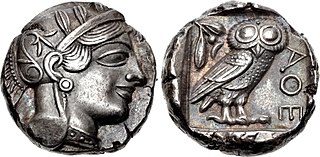 W
WThe Athenian coinage decree also known as the Standards decree was a decree made by the Athenians to standardise currency amongst the states with whom they were allied. Between the years of 450 and 447 BC, the use of Athenian silver currency and Athenian weights and measures was made obligatory in all allied states of the Athenian Empire.
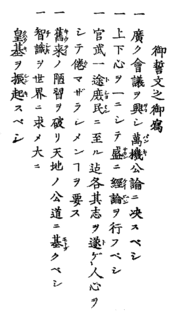 W
WThe Charter Oath was promulgated at the enthronement of Emperor Meiji of Japan on 6 April 1868 in Kyoto Imperial Palace. The Oath outlined the main aims and the course of action to be followed during Emperor Meiji's reign, setting the legal stage for Japan's modernization. This also set up a process of urbanization as people of all classes were free to move jobs so people went to the city for better work. It remained influential, if less for governing than inspiring, throughout the Meiji era and into the twentieth century, and can be considered the first constitution of modern Japan.
 W
WThe Chinese Communist Party Admission Oath is an oath that prospective members of the Chinese Communist Party must take to become a party member according to Article 6 of the Constitution of the Chinese Communist Party.
 W
WThe constitutional oath of office of China is the oath or affirmation that is used in China — which is referred to either as: the People's Republic of China or the Republic of China.
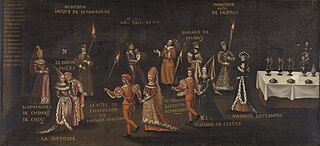 W
WThe Feast of the Pheasant was a banquet given by Philip the Good, Duke of Burgundy on 17 February 1454 in Lille, now in France. Its purpose was to promote a crusade against the Turks, who had taken Constantinople the year before. The crusade never took place.
 W
WMilitary oath in the Finnish Defence Forces is taken by conscripts on a legal basis in the beginning of their military service. If the conscript is unwilling to take the oath, another option is to take the military affirmation. Before the conscript is to take the oath, he must be briefed on the rights and responsibilities of a soldier, as well as on the meaning of the oath. The oath is administered by the unit's commanding officer and in the presence of the unit's flag. The military oath used to be available only to members of the church, however, current legislation no longer makes such a distinction.
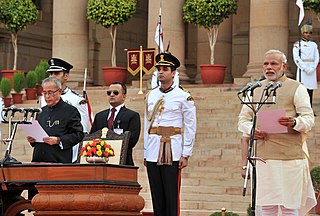 W
WNarendra Modi, parliamentary leader of the Bharatiya Janata Party, started the first tenure of his prime ministership, after his swearing-in as the 14th Prime Minister of India on 26 May 2014. 45 other ministers were also sworn in along with Modi. The ceremony was noted by media for being the first ever swearing-in of an Indian Prime Minister to have been attended by the heads of all SAARC countries.
 W
WThe Hong Kong Legislative Council members' oath-taking controversy was a series of events surrounding the oaths of office of a dozen pro-democracy and localist members-elect of the Legislative Council of Hong Kong (LegCo) on 12 October 2016 which have resulted in the disqualification of six members, Sixtus "Baggio" Leung and Yau Wai-ching of Youngspiration, who were unseated by the court on 15 November 2016, and Leung Kwok-hung, Nathan Law, Yiu Chung-yim and Lau Siu-lai on 14 July 2017.
 W
WOath of the Horatii, is a large painting by the French artist Jacques-Louis David painted in 1784 and now on display in the Louvre in Paris. The painting immediately became a huge success with critics and the public, and remains one of the best known paintings in the Neoclassical style.
 W
WKościuszko's proclamation refers to a speech given by Tadeusz Kościuszko in Kraków on March 24, 1794. The speech is considered the starting point of the Kościuszko's Uprising against the forces of Imperial Russia occupying Poland.
 W
WA loyalty oath is a pledge of allegiance to an organization, institution, or state of which an individual is a member. In the United States, such an oath has often indicated that the affiant has not been a member of a particular organization or organizations mentioned in the oath.
 W
WMarriage vows are promises each partner in a couple makes to the other during a wedding ceremony based upon Western Christian norms. They are not universal to marriage and not necessary in most legal jurisdictions. They are not even universal within Christian marriage, as Eastern Christians do not have marriage vows in their traditional wedding ceremonies.
 W
WAn oath of office is an oath or affirmation a person takes before assuming the duties of an office, usually a position in government or within a religious body, although such oaths are sometimes required of officers of other organizations. Such oaths are often required by the laws of the state, religious body, or other organization before the person may actually exercise the powers of the office or organization. It may be administered at an inauguration, coronation, enthronement, or other ceremony connected with the taking up of office itself, or it may be administered privately. In some cases it may be administered privately and then repeated during a public ceremony.
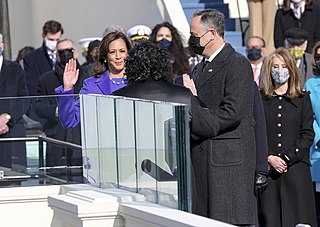 W
WThe oath of office of the vice president of the United States is the oath or affirmation that the vice president of the United States takes upon assuming the vice-presidency but before he or she begins the execution of the office. It is the same oath that members of the United States Congress and members of the president's cabinet take upon entering office.
 W
WThe oath of Pontida, according to tradition, would have been a ceremony that would have sanctioned on 7 April 1167, in the abbey of Pontida, near Bergamo, in Italy, the birth of the Lombard League, or of a military alliance between the municipalities of Milan, Lodi, Ferrara, Piacenza and Parma aimed at the armed struggle against the Holy Roman Empire by Frederick Barbarossa.
 W
WThe Oaths of Strasbourg were a military pact made on the 14th of February, A.D. 842 by Charles the Bald and Louis the German against their older brother Lothair I, the designated heir of Louis the Pious, the successor of Charlemagne. One year later the Treaty of Verdun would be signed, with major consequences for Western Europe's geopolitical landscape.
 W
WThe Oxford Oath, or Oxford Pledge, is the name commonly given to a resolution carried by students of the Oxford Union that "this House will in no circumstances fight for its King and Country". It was passed by 275 votes to 153 at the King and Country debate on 9 February 1933.
 W
WTo make a pinky promise, or pinky swear, is a traditional gesture most commonly practiced amongst children involving the locking of the pinkies of two people to signify that a promise has been made. The gesture is taken to signify that the person can break the finger of the one who broke the promise. The tradition appears to be a relatively modern invention, possibly as a continuation of older finger traditions.
 W
WThe Constitution Amendment (Pledge of Loyalty) Act 2006 No 6, was an Act to amend the Constitution Act 1902 to require Members of the New South Wales Parliament and its Ministers to take a pledge of loyalty to Australia and to the people of New South Wales instead of swearing allegiance to the Queen her heirs and successors, and to revise the oaths taken by Executive Councillors. The Act was assented to by the Queen on 3 April 2006.
 W
WThe Promissory Oaths Act 1871 is an Act of the Parliament of the United Kingdom.
 W
WThe Quakers Act 1695 was an Act of the Parliament of England which allowed Quakers to substitute an affirmation where the law previously required an oath. The Act did not apply to the oaths required when giving evidence in a criminal case or to serve on a jury or to hold any office of profit from the Crown. It allowed legal proceedings to be taken against Quakers before a Justice of the Peace for refusing to pay tithes if the amount claimed did not exceed £10. The Act would have expired in seven years but, in 1702, Parliament extended it for another eleven years by the Affirmation by Quakers Act 1701. In 1715, it was made permanent and applied also to Scotland.
 W
WSince the publication of Scouting for Boys in 1908, all Scouts and Girl Guides around the world have taken a Scout promise or oath to live up to ideals of the movement, and subscribed to a Scout Law. The wording of the Scout Promise and Scout Law have varied slightly over time and from country to country. Some national organization promises are given below. Although most Scouting and Guiding organizations use the word "promise", a few such as the Boy Scouts of America tend to use "oath" instead. Typically, Scouts and Guides will make the three-fingered Scout Sign when reciting the promise.
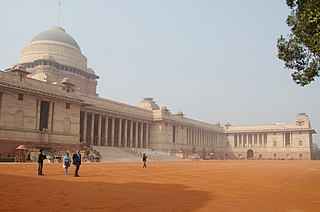 W
WNarendra Modi, parliamentary leader of the Bharatiya Janata Party, started his tenure after his swearing-in as the 16th Prime Minister of India on 30 May 2019. Several other ministers were also sworn in along with Modi. The ceremony was noted by media for being the first ever swearing-in of an Indian Prime Minister to have been attended by the heads of all BIMSTEC countries.
 W
WIn Greek mythology, Styx is a deity and a river that forms the boundary between Earth and the Underworld. The rivers Acheron, Cocytus, Lethe, Phlegethon, and Styx all converge at the center of the underworld on a great marsh, which sometimes is also called the Styx. According to Herodotus, the river Styx originates near Pheneus. Styx is also a goddess with prehistoric roots in Greek mythology as a daughter of Tethys, after whom the river is named and because of whom it had miraculous powers.
 W
WThe Oath of Supremacy required any person taking public or church office in England to swear allegiance to the monarch as Supreme Governor of the Church of England. Failure to do so was to be treated as treasonable. The Oath of Supremacy was originally imposed by King Henry VIII of England through the Act of Supremacy 1534, but repealed by his elder daughter, Queen Mary I of England, and reinstated under Henry's other daughter and Mary's half-sister, Queen Elizabeth I of England, under the Act of Supremacy 1559. The Oath was later extended to include Members of Parliament and people studying at universities. Catholics were first allowed to become members of parliament in 1829, and the requirement to take the oath for Oxford University students was lifted by the Oxford University Act 1854.
 W
WA Teacher's Oath is an oath taken in some countries by teachers.
 W
WOn 20 June 1789, the members of the French Third Estate took the Tennis Court Oath, voting "not to separate and to reassemble wherever necessary, until the Constitution of the kingdom is established". It was a pivotal event in the French Revolution. The Estates-General had been called to address the country's fiscal and agricultural crisis, but they had become bogged down in issues of representation immediately after convening in May 1789, particularly whether they would vote by order or by head.
 W
WThe oath of office of the president of the United States is the oath or affirmation that the president of the United States takes upon assuming office. The wording of the oath is specified in Article II, Section One, Clause 8, of the United States Constitution, and a new president must take it before exercising or carrying out any official powers or duties.